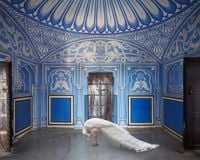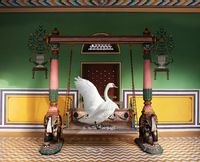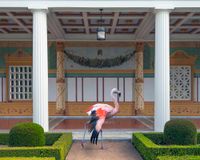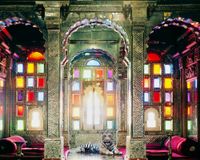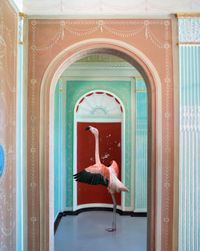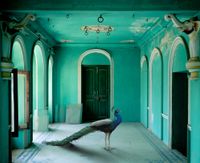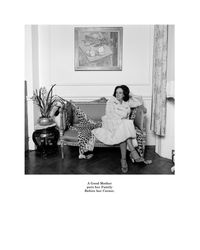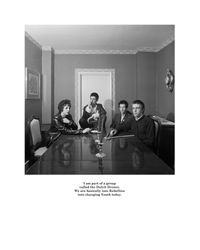Born in 1954 in Frankfurt but raised in San Juan, Puerto Rico, Karen Knorr is a London-based artist who uses digital photography and moving image to create conceptual and multidisciplinary works. These works feature opulent interiors while critically and playfully investigating issues of cultural heritage, colonialism, class, and gender power structures. She has a BA Hons from the Polytechnic of Central London (1977–1980) and an MA from the University of Derby (1988–1990).
Read MoreKnorr's earlier works lean towards social documentary. For example, 'Belgravia' (1979–1981) is a series of black-and-white photographs of the British upper classes in stiff or contrived poses in upper-class residences during the early Thatcher years. Her 'Gentlemen' series (1981–1983)—also black-and-white photographs—depict English gentlemen's clubs in Saint James', London, problematising gender and class divides. 'Country Life' (1983–1985) takes on the landed gentry class in their countryside surroundings and the manner in which objects fulfil class destiny. In all three series, her humorous and satirical texts accompany but do not illustrate the works, raising questions about the lifestyle, aspirations, and values of the British upper classes.
Knorr turned to colour photography in 1986 with 'Connoisseurs' (1986–1990), using Cibachrome to saturate and vivify the hues in her photographs of the interiors of homes and museums. Incongruous objects and comical subject poses were staged and photographed in these analogue prints to destabilise notions of connoisseurship, aestheticism, and beauty embedded within heritage culture. 'Academies' (1994–2005) continued the artist's investigation into museum spaces and fine art academies in Europe, reflecting a deeper theoretical and critical engagement with how Western fine art becomes institutionalised. With 'Fables' (2003–2008), she fused analogue and digital photography; digital photographs she took of live and taxidermied animals were collaged onto her analogue photographs of the lavish aristocratic interiors of castles, villas, and museums, injecting a sense of the surreal and uncanny.
Knorr cites her 'India Song' series (2008–2017) as a turning point. For the series, the sumptuous interiors of palaces and holy sites in Rajasthan were photographed with a large-format Sinar p3 analogue camera, and digital photographs of animals such as peacocks and monkeys were subsequently painstakingly Photoshopped in, to index the Panchatantra—a collection of Sanskrit animal fables—and to challenge fixed notions of Indian cultural heritage, caste, and gendered spaces. Inspired by screen paintings from the Edo period (1603–1867), her 'Monogatari' series (2012–2017) portrayed the animals often featured on these screens within Japanese shrines, temples, and ryokans, referencing Japanese, Taoist, and Buddhist folktales. 'Metamorphoses' (2014–2018) continues her multidisciplinary explorations of heritage interiors, visual culture, literary frameworks, and social hierarchies.
Knorr won the Pilar Citoler International Biennial Prize for Contemporary Photography in 2011, and in 2018, she was one of six leading photographers awarded an Honorary Fellowship by The Royal Photographic Society. She currently teaches photography at the University for the Creative Arts in Farnham. She has presented solo shows at the Kochi-Muziris Biennale (India Song, 2017); Musée Carnavalet, Paris (Fables, 2010); and Shanghai Centre of Photography (with Anna Fox, Another Way of Telling, 2018), among others, and participated in many international group exhibitions. Her works are included in the collections of major museums such as Tate, London; Centre Pompidou, Paris; Victoria and Albert Museum, London; Moderna Museet, Stockholm; and The National Museum of Modern Art, Kyoto.
Elaine Chiew | Ocula | 2019
